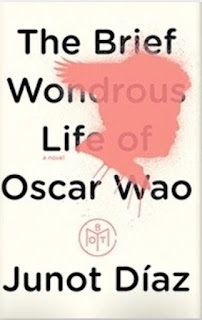The Wonderous Life of Oscar Wao
For once I am at a
bit of a loss as to what to write about a book. Junot Díaz’s The Brief Wondrous Life of Oscar Wao is
a complex and highly original novel, and yet I have hesitated to write about what it might all mean, as I considered how I might
distil my thoughts about it into a few paragraphs. The result of this has been
a pause been reading and an attempt to write – what follows, therefore, is but
flawed thoughts on a Pulitzer Prize winning novel. Others – closer to the
American and Dominican Republic contexts – can do much more.
On form – the novel
opens in mock-essay form, as the narrator describes the concept of fukú – a
sinister sort of karma – and connect this to the sense of comic-tragic tones of
Oscar’s “brief wondrous life”, as well as the dictatorship of Trujillo in the
Dominican Republic. This is done via lengthy footnotes, in an extravagant manner
that reminds me a little of Paul Auster’s Oracle
Night. Chapter 1 then transitions from the narrator (‘Our hero was not one
of those Dominican cats …’) to a third person view – in the main – of Oscar’s
life, growing up in New York. As the novel proceeds, however, other viewpoints
take over, including Oscar’s troubled sister, Lola, and her teenage adventures;
Yunior, Oscar’s one-time room-mate and would-be boyfriend to Lola; and the
story of Oscar’s family troubles in the Dominic Republic in the dictatorship
years, particularly as relates to the fate of his grandfather and the story of
his mother’s life.
On Language – The variety
of viewpoints, and the changing of forms of narration, mean that the novel is
full of rich and varied language. There is the colloquial, teenage slang in
dialogue (What you doing? Like nothing. Like let’s go to a movie, then. Life OK’
(p.38). There is an ironic version of a Marquez family-narrative, in openings
to chapters such as: ‘When the family talked about it at all – which is like
never – they always begin in the same place: with Abelard and the Bad Thing he
said about Trujillo’ (p.211). Then there are metafictional sections of
commentary, such as ‘A Note from Your Author’: ‘I know what Negroes are going
to say. Look, he’s writing Suburban Tropical now. A puta and she’s not an
underage snort-addicted mess? Not believable. Should I go down to the Feria and
pick me up a more representative model?’ (284). There’s more variations to
explore in the novel, but this gives you an idea.
On Fukú –
Ultimately this is a tragic story about the death of a young man – this is in
the title – someone who is a misfit and a nerd, and whose generational story
and coming of age story are told in a comic-tragic tone that befits the concept
of “fukú”. There are several beatings in the story that are horrific, and if nothing
else, the reader comes away with a better sense of how brutal life was under
the dictatorship from the 1930s to early 1960s. This is possibly the part of writing
about the novel I have baulked at – I know a little about the dictatorships in
Chile and Argentina, and a little about the political forces in the South
American continent at large. But of the Caribbean dictatorial regimes of Cuba,
Nicaragua, Guatemala, El Salvador, Honduras, Venezuela, and Haiti and the
Dominican Republic in particular, I am a lost Australian with few immediate
cultural reference points. This is to point at my ignorance and not a criticism
of the novel – which takes the unusual step of providing footnote material of
an historical nature to balance out the dark and lightness of the narrative
itself with a more objective set of facts. American readers, New York readers
in particular, and people from the Caribbean and its diaspora will recognise
many details without these footnotes, and see the tale in a more connected way
to their cultural, historical and family stories.
It's a brief and wondrous life, and given the history of the
period, this is unsurprising cornerstone of an original novel.




Comments
Post a Comment